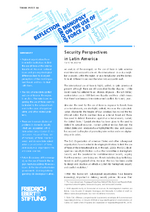Think Piece No. 4: Security Perspectives in Latin America
Summary
- Regional organizations have invested in institutions to limit the use of force at the international level. However, national issues and growing ideological differences lead to divergent perceptions of the most important threats and how to deal with them.
- The risks of inter-state conflict and use of force in the region is very low. The main issues regarding the use of force seem to be limited to the national levels, even in the cases of organized crime, and other related problems.
- There are two main clusters of problems in domestic security which are associated with (i) state actors (securitization & militarization, misuse of force, lack of monopoly of force in certain areas) and (ii) non-state violent actors (»privatization« of force, state capture by organized crime, anti-state violence).
- Future discussions of the monopoly on the use of force in the region must also address three new issues: (i) the rise of authoritarian governments, (ii) rising defense spending (iii) ideological rivalries.
Jácome, Francine
Security perspectives in Latin America
Zum Download (PDF) (220 KB, PDF-File)
Latest Issues
- Mely Caballero-Anthony, Frieden und Sicherheit | Publikation
Think Piece 22: Security in Times of Uncertainty in Asia
Asias security outlook still appears to be laden with uncertainties. From the changing dynamics in the balance of power, an emboldened North Korea and…
- Ann L. Phillips, Frieden und Sicherheit | Publikation
Think Piece 21: Providing Security in Times of Uncertainty
The final report, distills the findings of a two-year effort by more than 20 international experts to find answers on how to overcome rising…
- Jaïr van der Lijn, Publikation
Think Piece 20: The future of the monopoly on the legitimate use of force - Four alternative global futures
The paper presents four alternative global futures for the monopoly on the legitimate use of force that aim to allow policy makers to embrace…
